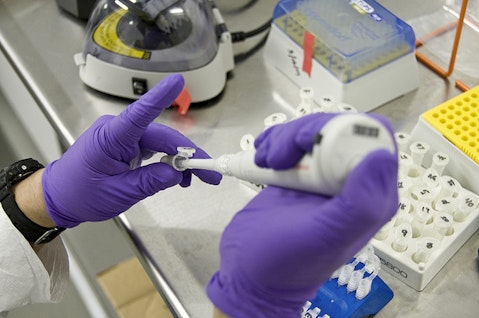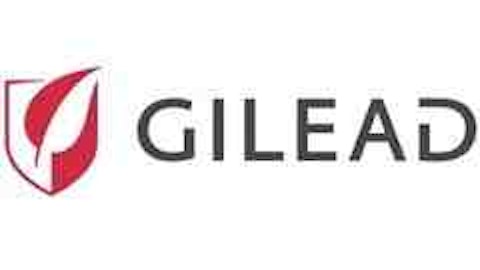Inovio Pharmaceuticals Inc (NASDAQ:INO) has spiked by over 29% on Monday morning after the firm announced a strategic cancer vaccine collaboration and license agreement with AstraZeneca plc (ADR) (NYSE:AZN)’s MedImmune unit. As part of the agreement, MedImmune, AstraZeneca’s biologics research and development group, will have the exclusive rights to Inovio’s INO-3112 treatment, a combination of VGX-3100, Inovio’s most mature candidate in its pipeline, and IL-12, the firm’s immune activator. INO-3112, which is currently in phase I/II clinical trials for cervical and head and neck cancers is a treatment for human papillomavirus (HPV) type 16 and 18-caused cancers. Type 16 and 18 HPV cancers account for over 70% of cervical pre-cancers and cancers. The value of the partnership with AstraZeneca plc (ADR) (NYSE:AZN) is potentially worth as much as $700 million to Inovio depending on the development and commercial milestones that are achieved. The rise of Inovio’s stock today is doubly significant as it just reported results for its second quarter which missed Wall Street estimates. The firm reported a loss of $0.09 per share on revenues of $5.3 million, below expectations of a loss per share of $0.04 on revenues of $11 million.

As the financial results for early-level biopharmaceutical companies are far less relevant than the progress of their treatment candidates or such partnerships as announced today, it’s unsurprising that the market has put far more weight behind the collaboration with AstraZeneca plc (ADR) (NYSE:AZN) than on the unexpectedly low revenues for the quarter. Based on our data, hedge funds appear to have foreseen the disappointing second quarter for Inovio Pharmaceuticals Inc (NASDAQ:INO), though not the partnership and resultant surge in its stock price. By the end of March, a total of nine of the hedge funds tracked by Insider Monkey were long in this stock, one more than from the end of the fourth quarter. However, the total value of holdings owned by hedge funds declined by 26.62% during the first quarter, to $4.8 million, while the stock was down by 11.11% during this period, so there was a flight of capital from the stock. Furthermore, as less than 1% of the firm’s outstanding shares are owned by hedge funds, hedge funds were not overly optimistic about the stock. The smart money was not wrong to do so, as shares fell by over 10% in the second quarter.
In 2014, equity hedge funds returned just 1.4%. In 2013, that figure was 11.3%, and in 2012, they returned just 4.8%. These are embarrassingly low figures compared to the S&P500 ETF (SPY)’s 13.5% gain in 2014, 32.3% gain in 2013, and 16% gain in 2012. Does this mean that hedge fund managers are dumber than a bucket of rocks when it comes to picking stocks? The answer is definitely no. Our small-cap hedge fund strategy – which identifies the best small-cap stock picks of the best hedge fund managers – returned 28.2% in 2014, 53.2% in 2013, and 33.3% in 2012, outperforming the market each year (it’s outperforming it so far in 2015 too). What’s the reason for this discrepancy, you may ask? The reason is simple: size. Hedge funds have gotten so large, they have to allocate the majority of their money into large-cap liquid stocks that are more efficiently priced. They are like mutual funds now. Consider Ray Dalio’s Bridgewater Associates, the largest in the industry with about $165 billion in AUM. It can’t allocate too much money into a small-cap stock as merely obtaining 2% exposure would really move the price. In fact, Dalio can’t even obtain 2% exposure to many small-cap stocks, even if he essentially owned the entire company, as they’re simply too small (or rather, his fund is too big). This is where we come in. Our research has shown that it is actually hedge funds’ small-cap picks that are their best performing ones and we have consistently identified the best picks of the best managers, returning 123.1% since the launch of our small-cap strategy compared to less than 60% for the S&P500 (see the details).
Insider purchases or sales of shares is another area Insider Monkey looks at, to gauge insider sentiment. While there has been no sale of shares on record by Inovio insiders since 2012, Director Angel Cabrera acquired 8,000 shares of the company on April 13 of this year.
Camber Capital Management, helmed by Stephen DuBois, held the most valuable position in Inovio Pharmaceuticals Inc (NASDAQ:INO) on March 31, with 250,000 shares for a $2 million position. The biggest seller of Inovio stock was Fred Knoll’s Knoll Capital Management, which divested 82,088 shares worth about $754,000. Glenn Russell Dubin of Highbridge Capital Management was right behind this move, selling 37,359 shares.
Disclosure: None





